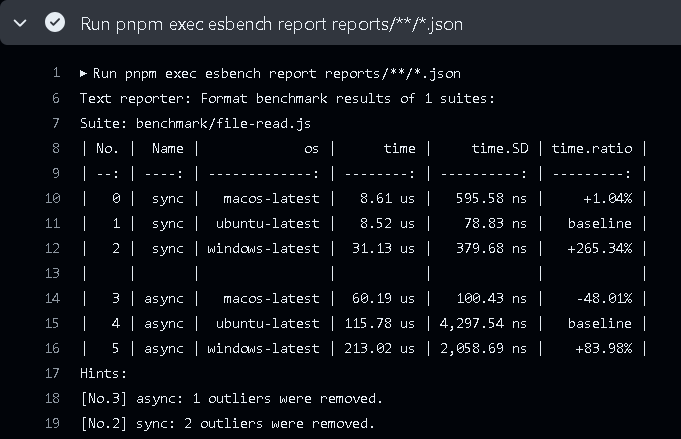Command Line Interface
Commands
esbench
Start ESBench in the current directory.
Options:
| Options | |
|---|---|
--config <file> | Use specified config file (string) |
--logLevel <level> | info | warn | error | off (string) |
--no-loader | Disable builtin TypeScript loader (boolean) |
--tag <name:value> | Add variables to the results (string[]) |
--file <path> | Run only suite that contains the value in their paths (string) |
--name <regex> | Run benchmark with names matching the Regex pattern (string) |
--builder <regex> | Run only suites built with the specified builder which name matching the Regex pattern (string) |
--executor <regex> | Run benchmarks using only the executor which name matching the Regex pattern (string) |
--shared <shared> | The test suite shard to execute in a format of <index>/<count> (string) |
# Run all suites
esbench
# Run case "For-index" in suite files that paths contains "array-sum.js`
esbench --file array-sum.js --name ^For-index$report
Generate report from result files that generated by Raw Reporter.
Options:
| Options | |
|---|---|
--config <file> | Use specified config file (string) |
--no-loader | Disable builtin TypeScript loader (boolean) |
<patterns...> | Glob patterns for files to load (string[]) |
# Combine results files into one report
esbench report reports/benchmark-*.jsonAdvanced Usage
Cross OS Benchmark
Although ESBench has a built-in toolchains and parameters as variables, this is not all factors in the performance of a function. External environments (such as OS and hardware) are not controlled by ESBench, but you can tag them with the --tag argument.
The GitHub Actions shows how to run benchmarks on different OS and merge the results into a single table:
name: Cross OS Example
on: [push]
jobs:
# First run the benchmarks in 3 operating systems.
run:
strategy:
matrix:
os: [macos-latest, windows-latest, ubuntu-latest]
runs-on: ${{ matrix.os }}
steps:
# Initialize repository
- uses: actions/checkout@v4
- uses: actions/setup-node@v4
with:
node-version: latest
- uses: pnpm/action-setup@v3
with:
version: latest
run_install: true
# Use --tag argument to add the OS name to result.
- run: pnpm exec esbench --tag os:${{ matrix.os }}
# Upload the result file to Actions Artifacts
- uses: actions/upload-artifact@v4
with:
name: result-${{ matrix.os }}
# This is the default path of Raw Reporter.
path: node_modules/.esbench/result.json
# Start a Job to generate the report.
report:
runs-on: ubuntu-latest
# Should run after all the benchmarks finished.
needs: run
steps:
# Initialize repository
- uses: actions/checkout@v4
- uses: actions/setup-node@v4
with:
node-version: latest
- uses: pnpm/action-setup@v4
with:
version: latest
run_install: true
# Download result files from Actions Artifacts.
# Filename is like:
# reports/result-${{ matrix.os }}/result.json
- uses: actions/download-artifact@v4
with:
path: reports
pattern: result-*
# Use the report command to collect all results
- run: pnpm exec esbench report reports/**/*.jsonimport { readFileSync } from "node:fs";
import { readFile } from "node:fs/promises";
import { defineSuite } from "esbench";
const filename = "pnpm-lock.yaml";
export default defineSuite({
baseline: {
type: "os",
value: "ubuntu-latest"
},
setup(scene){
scene.bench("sync", () => readFileSync(filename));
scene.benchAsync("async", () => readFile(filename));
}
});
Sharding
When you have a lot of suites, benchmarking can take very long time, and one way to speed things up is to use multiple machines to run them simultaneously.
By using --shared argument, ESBench splits suites into multiple different runs, for example --shared 1/3 split the suite into three shards, each running one third of the suites.
GitHub action example (repository):
name: Sharding Example
on: [push]
jobs:
run:
# Schedule 3 instances to run benchmark
strategy:
matrix:
index: [1, 2, 3]
total: [3]
runs-on: ubuntu-latest
steps:
# Initialize repository
- uses: actions/checkout@v4
- uses: actions/setup-node@v4
with:
node-version: latest
- uses: pnpm/action-setup@v3
with:
version: latest
run_install: true
# Use `--shared` to make ESBench run partial of suites.
- run: pnpm exec esbench --shared ${{ matrix.index }}/${{ matrix.total }}
# Upload the result file to Actions Artifacts
- uses: actions/upload-artifact@v4
with:
name: result-${{ matrix.index }}.json
# This is the default output path of Raw Reporter.
path: node_modules/.esbench/result.json
# Start a Job to generate the report.
report:
runs-on: ubuntu-latest
# Should run after all the benchmarks finished.
needs: run
steps:
# Initialize repository
- uses: actions/checkout@v4
- uses: actions/setup-node@v4
with:
node-version: latest
- uses: pnpm/action-setup@v4
with:
version: latest
run_install: true
# Download result files from Actions Artifacts.
# Filename is like:
# reports/result-${{ matrix.os }}/result.json
- uses: actions/download-artifact@v4
with:
path: reports
pattern: result-*
# Use the report command to collect all results
- run: pnpm exec esbench report reports/**/*.json--shared works at the suite level, which means benchmark cases inside a suite cannot be split. If the number of use cases within the suite varies too much, they will be distributed unevenly, causing some instances to run longer than others.